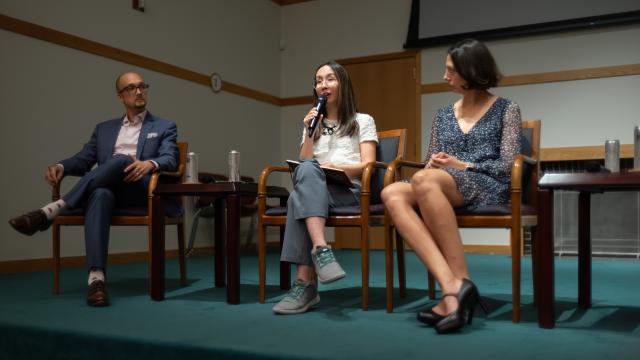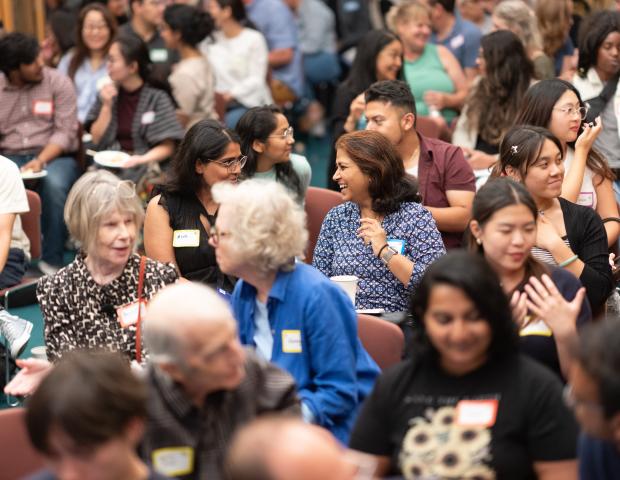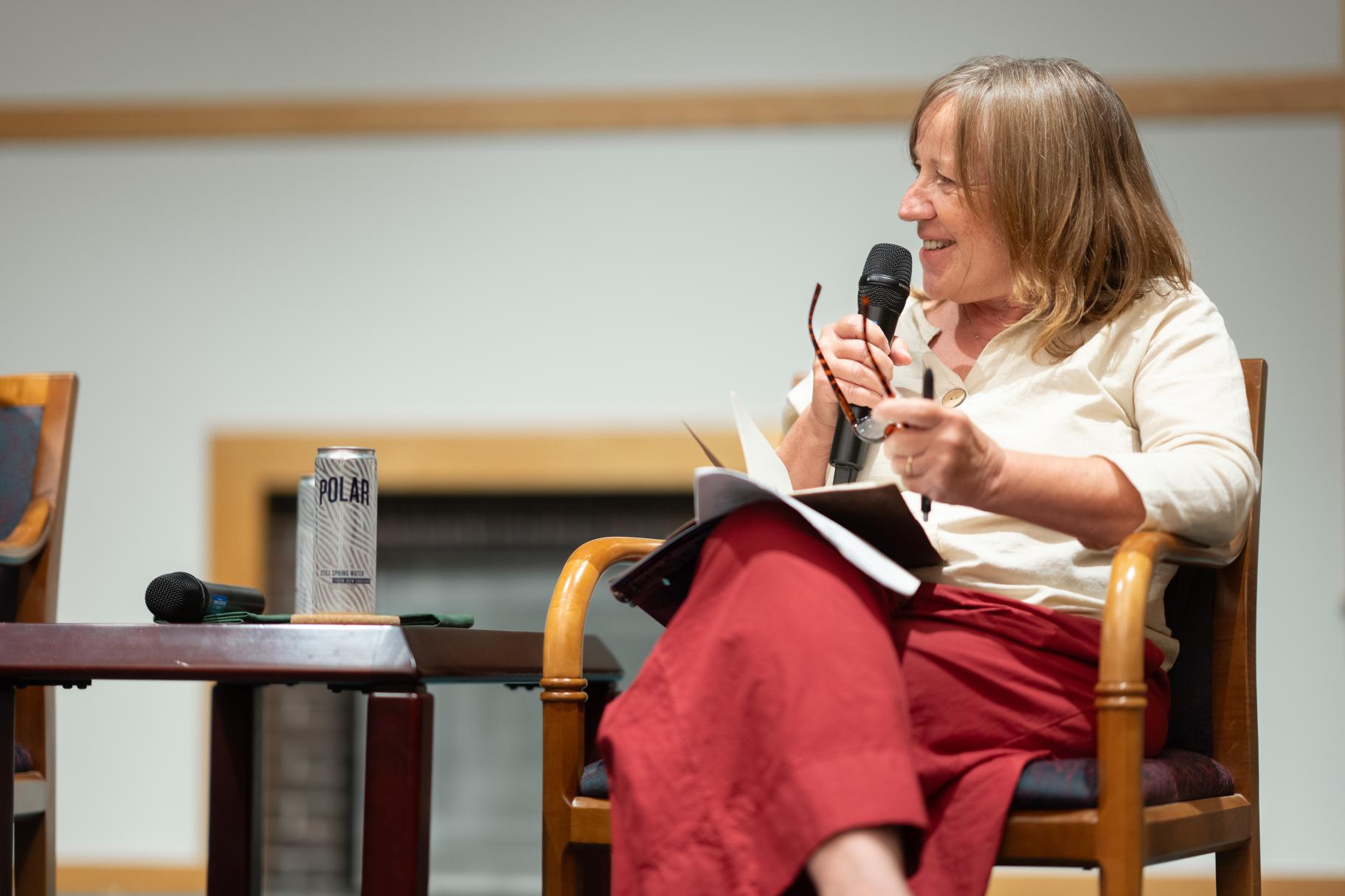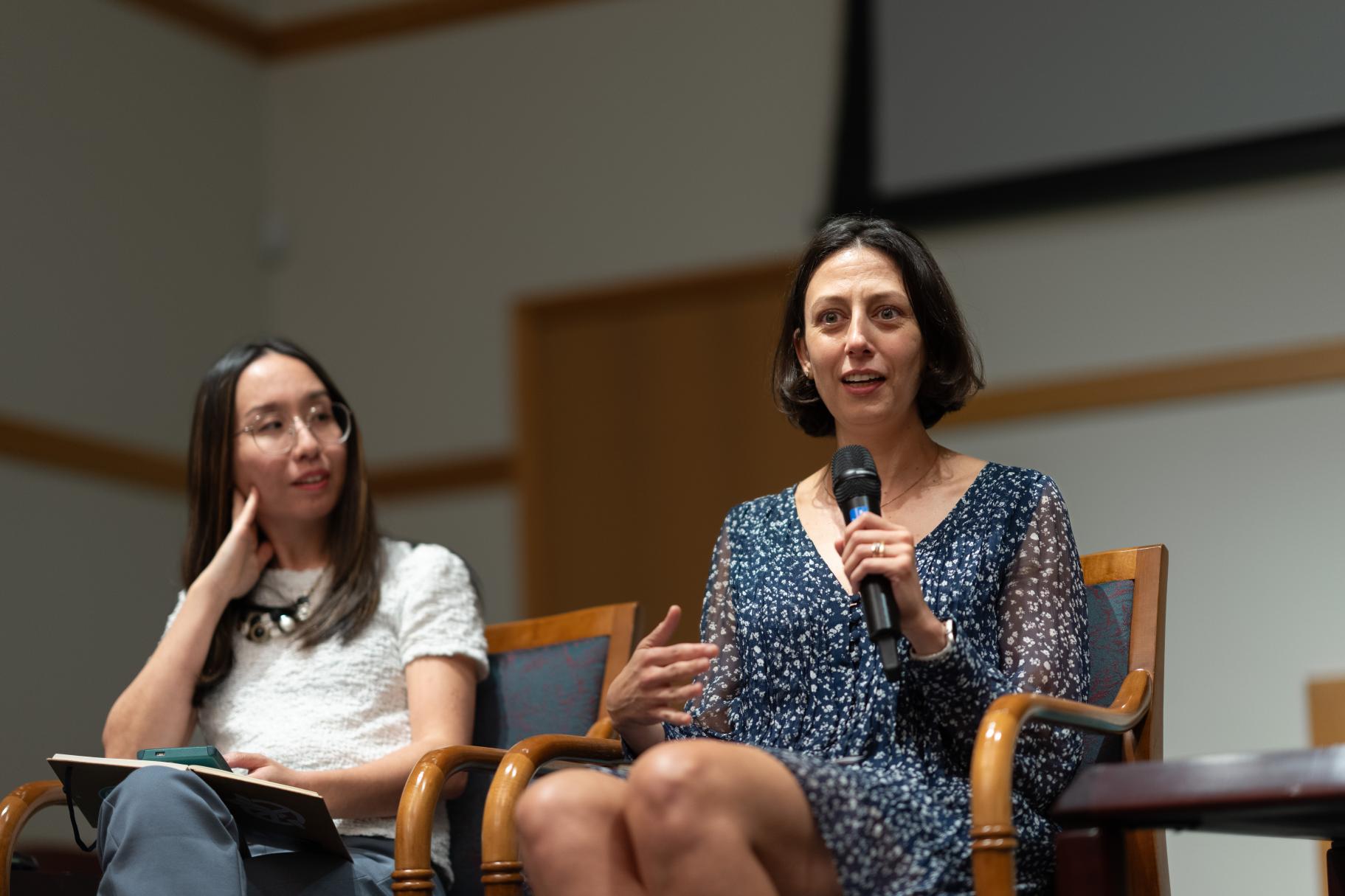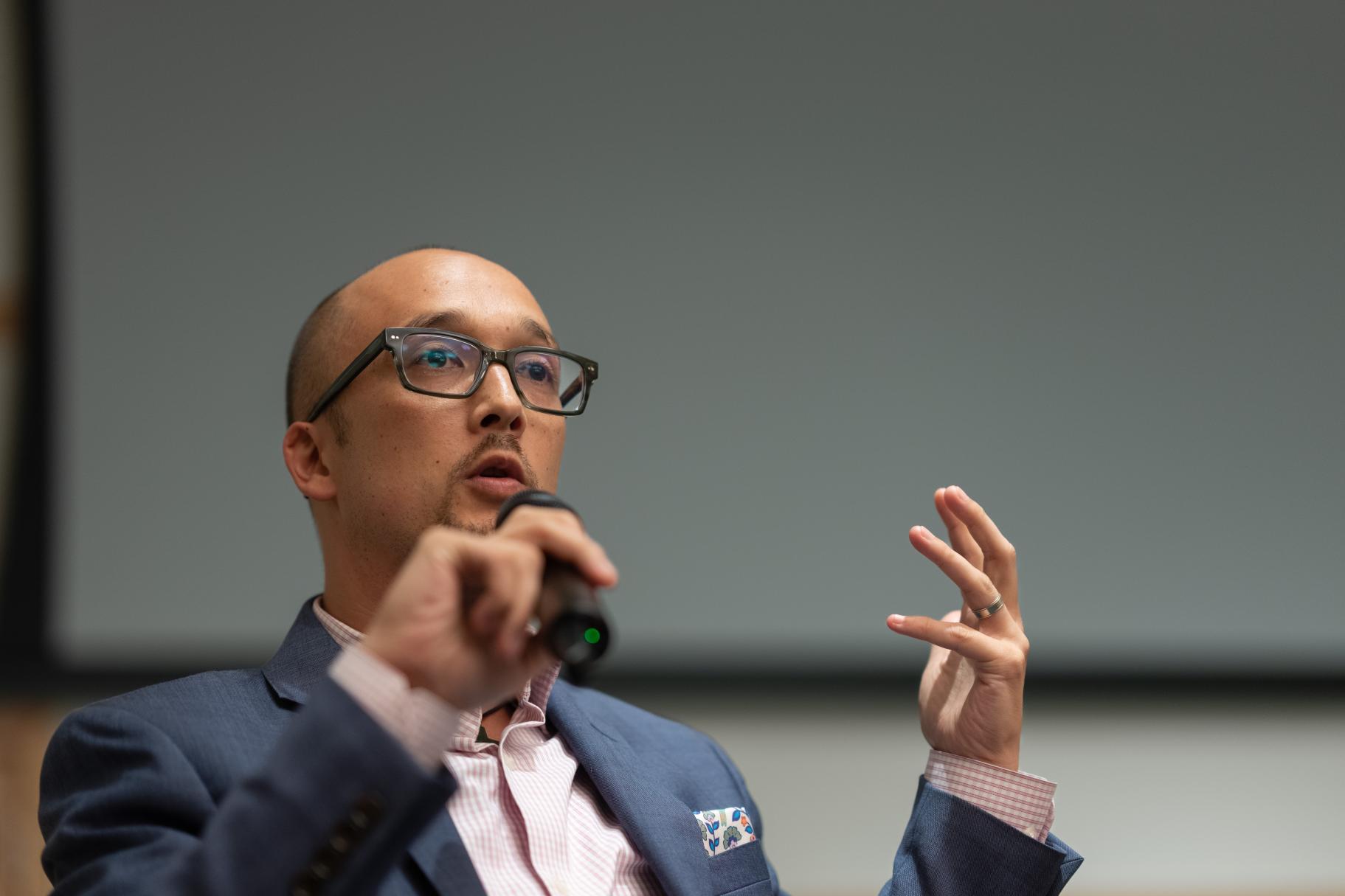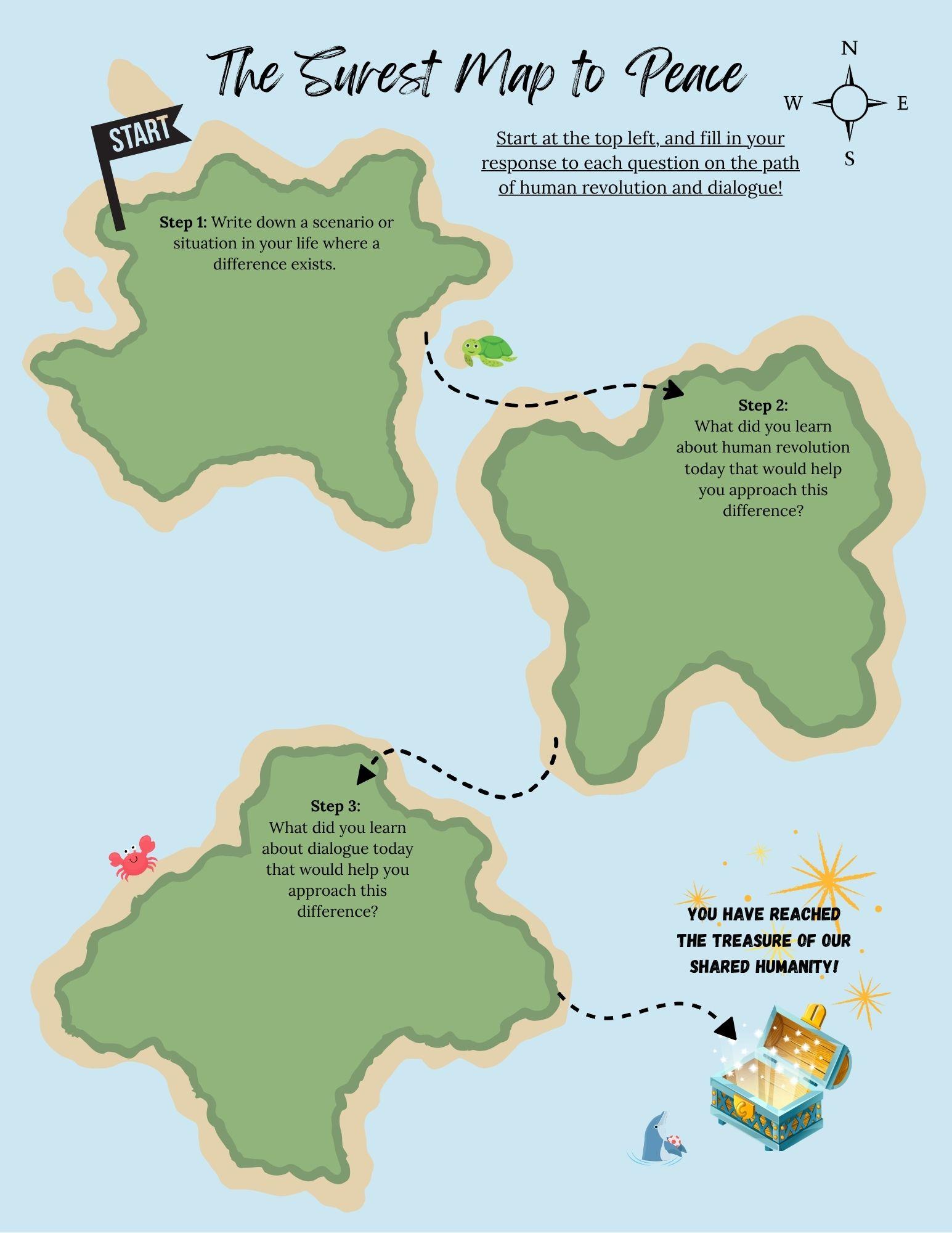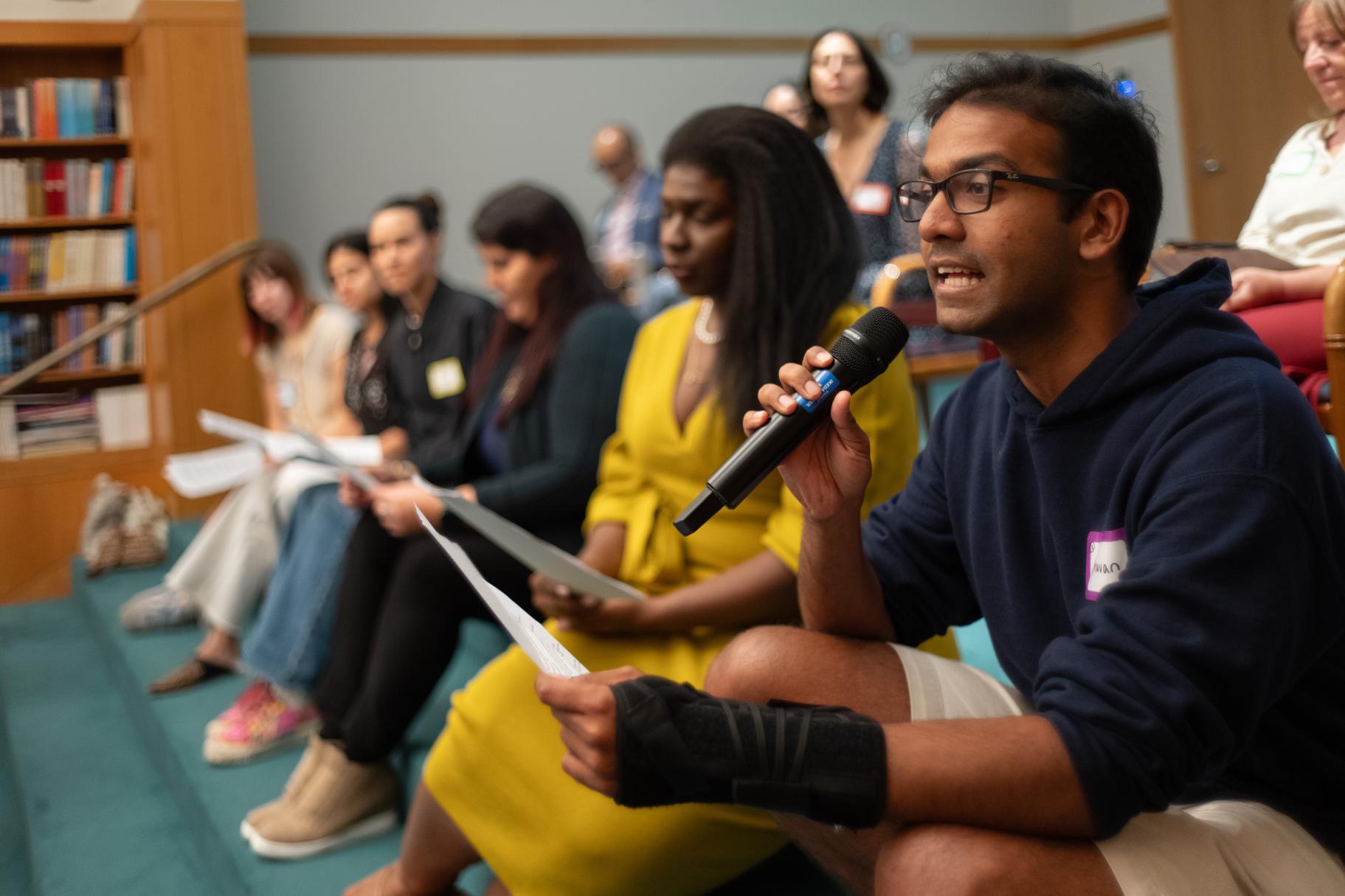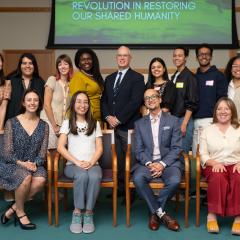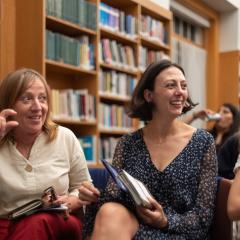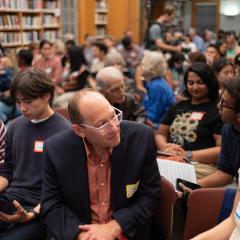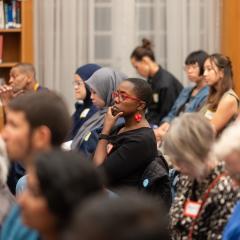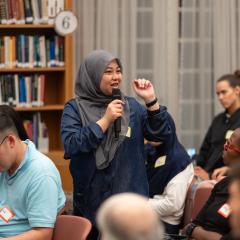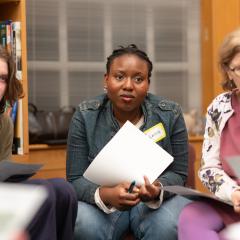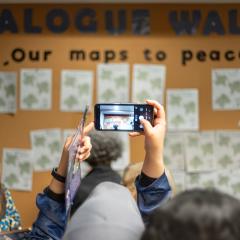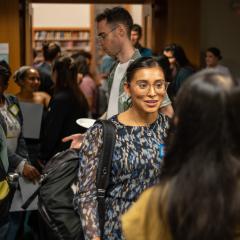2025 Ikeda Forum Explores Ways to Transform Our Polarization
In late September 2025, a time when political and social polarization is perceived by many as nearing crisis level in the US, a capacity crowd of more than 130 people from Greater Boston and New England gathered at the Ikeda Center to consider ways out of our dilemma. The occasion was the 21st Annual Ikeda Forum for Intercultural Dialogue, this year addressing the topic, “Engaging Difference in an Age of Division: The Power of Dialogue and Human Revolution in Restoring our Shared Humanity.”
On hand to share their expertise and insights were panelists Nadya Hajj of Wellesley College, Anna Ikeda of Soka Gakkai International (SGI), and James McCarty of Boston University. Their conversation was moderated by Catia Confortini, also of Wellesley College. Over the course of the evening, these panelists offered various perspectives on the core truth that while all of us are indeed individuals, there is no escaping the ways we all are interconnected, and, as Dr. McCarty phrased it, “bound up together” as people as we seek to live lives of greater peace and build a world of more widespread well-being.
After welcoming the capacity crowd, who included many first-time attendees, Ikeda Center Senior Program Manager Lillian Koizumi introduced Executive Director Kevin Maher, who discussed the founding philosophy of the Ikeda Forum series along with some of the key ideas that inspired this year’s topic. “For those who may be new to the Center,” said Maher, “we launched this annual forum in 2004 with the goal of exploring hope-filled philosophies drawn from cultural, literary, and peace traditions. As with all of our work, we are informed and inspired by our founder Daisaku Ikeda’s deep belief in the transformative power of dialogue.” Then, reflecting on the planning process leading up to the event, Maher thanked the panelists for “the thoughtfulness and care you’ve contributed to the development of our program,” adding that “our planning sessions have not only been stimulating, they have also been deeply collaborative, sparking new ideas and a shared sense of purpose. In a time when it can be easy to feel disheartened, these dialogues have given us real hope.” And, as always, he shared the words of Mr. Ikeda, whose vision of inner transformation through deep engagement with others informs every event hosted by the Center. “Dialogue starts from the courageous willingness to know and be known by others,” wrote Ikeda.
It is the painstaking and persistent effort to remove all obstacles that obscure our common humanity. Genuine dialogue is a ceaseless and profound spiritual exertion that seeks to effect a fundamental human transformation in both ourselves and others. Dialogue challenges us to confront and transform the destructive impulses inherent in human life. I earnestly believe that the energy generated by this courageous effort can break the chains of resignation and apathy that bind the human heart, unleashing renewed confidence and vision for the future.
Following Maher’s remarks, attendees engaged in a quick paired icebreaker activity on the questions: What intrigued you about this year’s Ikeda Forum theme? What motivated you to come tonight? This quick dialogue was followed by the presentation of a video featuring members of the Ikeda Center Youth Steering Committee reflecting on a special dialogue project they engaged in leading up to the Forum. As described by the Ikeda Center’s Preandra Noel, for four weeks, they engaged in a process of dialogical engagement with a situation or someone in their life where existing differences have been presenting a challenge. Guided by principles from the philosophy of Mr. Ikeda, and working with a fellow ICYC “human revolution and dialogue buddy,” participants endeavored to see how conscious and intentional engagement with human revolution and dialogue could bring positive results. During the video, participants shared their findings and learnings. Watch the full video here.
Panel Discussion: Human Revolution, Dialogue, and Shared Humanity
A Professor of Peace and Justice Studies at Wellesley, Catia Confortini kicked off the main discussion by expressing a spirit of “gratitude” for all involved, thanking the Ikeda Center team for their “unadulterated” kindness throughout the process and the panelists and youth for approaching the forum with “open hearts” and “vulnerability.” Then, as an opening question for each panelist, she asked: How have you been grappling with difference and division during these fraught times?
First to respond was Dr. Hajj, who is an Associate Professor in Peace and Justice Studies at Wellesley College and a Visiting Scholar with the Middle East Initiative at Harvard University. She observed that because her work deals with matters relating to Israel and Palestine there have been many heated differences in her classrooms. Reflecting on the nature of our current conflicts and a path forward, in the world and in her classroom, Dr. Hajj said she emphasizes with students three mental processes that she has found useful: First is “open acceptance,” learning to see that difference is normal. Second is to embrace difference, letting go of the ego response that always wants to control things and “impose my rightness on other people.” This is an endeavor that she sees as closely related to Ikeda’s notion of human revolution. And third, address conflicts by acting in coordination with others. She urges her students to see the process of bridging divides as “an act of co-creation.”
Speaking next was Anna Ikeda, who is a Representative to the UN for Disarmament for SGI and Program Coordinator for Disarmament at the SGI Office for UN Affairs, where her work focuses on nuclear abolition and stopping killer robots. She told a story from her recent experience that shed light on a fundamental aspect of many of our conflicts. A resident of Las Vegas, she was taking a nighttime cab ride, a circumstance where, given the nature of Las Vegas, one encounters much erratic driving. However, she was taken aback when the cab driver announced that this driving could be blamed on Blacks and Latinos who had “something fundamentally wrong with their psychology.” Ikeda was “astonished” and quickly considered whether to call out his racism or to simply withdraw from the conversation. Instead she sought to learn why he felt that way. It turns out that he had lost his business in Mexico where he had felt taken advantage of by the local community. While this did not excuse him, it helped Ikeda see that so many of us have background stories that are complex. To resist labeling or dismissing others out of hand, and instead see their humanity, is an act of human revolution for her.
Speaking last was Dr. McCarty, who is Clinical Assistant Professor and Director of the Religion and Conflict Transformation Program at Boston University’s School of Theology. He reflected on how, at a time when so much of our strife is happening nationally, globally, and online in social media, there is wisdom in turning toward a radically local and embodied community and experience, which is different than just isolating oneself or denouncing others. For him, it is “not just a question of how do I resist certain kinds of forces, but how do we build a different kind of vision, a different kind of structure, a different kind of way of being with one another.” To that end he has been engaging with difference in the classroom but also inviting diverse people into his home. His goal is to create spaces where “people can show up fully themselves and then we can actually hear the stories of other people rather than yelling talking points across the aisle.”
For the next round of questions Dr. Confortini asked Hajj and Ikeda to talk about what they perceive as the link between human revolution and dialogue as they ”relate to the work of engaging difference.” During her comments, Hajj dug deeper into what is needed for us to achieve a “just peace,” indicating that “two things need to happen in tandem.” The first is that “internal egoic shift away from control and wanting to have the win in a conversation or in a power struggle” that she spoke of. And that, second, is to see that “that internal shift as Jimmy said earlier, isn’t something that you do by locking yourself away in a room.” She also spoke about how in her own life she is trying to practice the “dialogue with nature” that Mr. Ikeda often speaks of. “And for me,” she said, “that’s been done through the practice of shinrin-yoku or guided forest bathing.” The phenomena of the natural world, she added, can reveal to us “that we can coexist amongst division and difference.”
Anna Ikeda opened her response by quoting Mr. Ikeda’s (no relation, she noted!) essay written soon after the horrible events of 9/11. “It is the function of evil to divide, to alienate people from each other and to divide one country from another,” wrote Ikeda. However, “in the end, the evil over which we must triumph is the impulse toward hatred and destruction that resides in us all.” And unless we learn “to perceive our intimate connection with all our fellow human beings and feel their sufferings as our own, we will never be free of conflict and war.” She then shared that she recently had to meet this challenge after viewing the comments section for a video on Hiroshima posted by a US lawmaker. Reacting to the overwhelming negativity there, she felt anger “swelling forth from within.” But what she soon realized is that everyone has their reasons for their beliefs whether it is how they feel, what they were taught at home and in school, fears of threats, etc., and that she should strive to frame the nuclear debate in such a way to reach as many people as possible, recognizing where they are coming from.
Extending these notions, Dr. Confortini asked how, in our divided society, can we bridge the apparent gap between individuals and the larger human community? How can we do this work of engaging across difference when our differences seem only to divide us? How do we realize Daisaku Ikeda’s idea of a collective turning toward our shared humanity? Acknowledging that this is a “really hard question,” Dr. McCarty zeroed in on three ways that members of our society seek to turn difference into division. First, our differences are presented in a way that stoke fear of the other. Next, difference is presented in the context of a scarcity model, in which the “other side” is seen as taking what is yours. Finally, when these two assertions are added together, it results in the dehumanization of the other. The antidote is to be curious and to never get sucked into the zero-sum game. See how flourishing is possible for all, and recognize how we are all bound up together, how “you can’t be safe if I’m not safe,” and how it’s hard to have peace when “one community is hoarding and another has not enough.”
As a related question, Dr. Confortini raised a point made by McCarty during the panelists’ discussions leading up to the event, which is that we have “over individualized the sense of self and lost the way that we become human in relationships.” Given that, asked Confortini, how do we learn that skill and become human in healthier ways? Essentially, said McCarty, we live in a world with structures that divide us. For example, consumer capitalism encourages us to focus only on the gratification of our own needs. One key antidote is to focus on our identities as “storytelling creatures.” This “automatically creates different kinds of connections, when we hear the stories of one another,” he said. Another is to understand our “humanness” as part of the natural world and “realize we’re dependent on everything from slugs to the movements of the wind and everything else.” Finally, anything we can do to “wrap our lives up in the lives of other people” will help.
As a final topic, panelists addressed the challenge of finding ways to restore our shared humanity in a world in which “power differentials and power structures” exist that can separate us and “obscure our common humanity?” Confortini asked, “In that context, what is the value of dialogue, where can the teaching of Mr. Ikeda help us wrestle with this, and how do we restore our shared humanity when we feel the “other” has lost their humanity?” Anna Ikeda thanked Confortini for her “thoughtful question” and said that her response may not address power imbalances but would hopefully illustrate the power of dialogue. Specifically she shared a story from the life of Setsuko Thurlow, who was 13-years old when the atomic bomb was dropped on Hiroshima. As a result of her experience, Setsuko became a renowned anti-nuclear activist. During one of her talks on peace, a high school student approached her and said that they can never forgive the Japanese because the student’s grandfather “suffered at the hands of the Japanese military during the world war.” In that moment, responding to the student’s pain, Setsuko listened sincerely and apologized on behalf of her country and continued their dialogue after the event. Several years after that encounter, the student wrote to Setsuko sharing that though they were unable to shift their perspective at the time, due to Setsuko’s sincere efforts to listen, the student decided that they would like to become someone who could contribute to the improvement of relations between China and Japan. “This story deeply touched me,” said Ikeda, “…it really stressed to me the power of sincere dialogue, which really restores our shared humanity.”
Dr. Hajj recognized that there are clear material differences in our world and that there are some with more power and resources than others. At the same time, she remarked that we often forget the power we do have, thinking, “I’m not one of those with a lot of power.” As a result, we “absolve ourselves” of the responsibility to take actions in the ways that we can. Hajj suggested that in the realm of dialogue, we can explore how we might be able to use our power and privilege, starting in our own lives, our homes, and our communities. She highlighted Dr. Confortini’s efforts to support students in Gaza in finding admission to colleges all over the world. It can also look like having the willingness to listen to someone, to show up for someone who’s struggling. “I think that’s one of the ways that in a world of extreme power differentials to recognize your own power…”
Referring back to Ikeda’s quote about dialogue starting with “the courageous willingness to know and be known by others,” McCarty talked about how being vulnerable and taking risks are actually components of courage. He gave an example of a reading his students were doing on historical injustices, which described a scenario of a person with more power in a community recognizing that to believe in the story of someone with less power in the community is to, in McCarty’s words, “have to change my entire sense of self, my entire identity.” In other words, it means to be open to being changed, which McCarty believes embodies courage.
Confortini added her reflections based on the dialogic process among the panelists that led up to this event. Her many takeaways had to do with the value and power in “being humble in who you are.” During this process, everyone opened up to one another, creating the kind of authenticity that is central to human revolution. She then invited participants to pose questions for the panelists.
The first person to pose a question was Saloni, one of the youth committee members that engaged in the human revolution and dialogue project shared in the opening video. As a professor at a local university, she has noticed there is a homogenous culture in which everyone in her classrooms tends to think alike. She wondered how we might address that situation.
Next, the panelists considered the related question of how to avoid a “single narrative” in classrooms. Hajj said she addresses this problem by creating what she calls a “multi-vocal” classroom. First, she lessens the power of the instructor to dictate the narrative by creating an “ungraded” classroom. Then she finds as many ways as possible to encourage the diverse, authentic voices of the students themselves. One idea could be inviting students to bring in an article or a piece of art, or music, inviting them to co-create the space together.
The final question addressed the challenge of initiating conversations that actually transcend difference, especially in an environment dominated by social media. McCarty emphasized the importance of creating spaces of safety before a good dialogue can take place, through activities such as trustbuilding exercises or creating shared guidelines which takes time. Accordingly, he said you will rarely find a “safe space” for constructive conversation in an environment that is characterized by random posts and comments, where anyone can hop in and out. The key to engaging on the level of shared humanity is to be “intentional” in creating the kinds of spaces that will honor that.
Breakout Group Discussion Activity: The Surest Map to Peace
Upon the conclusion of the panel session, the Center’s Anri Khare introduced the breakout group discussion activity inspired by Mr. Ikeda’s conviction that dialogue presents the surest path to peace. In this spirit, each participant received a “Surest Map to Peace” on which they were invited to brainstorm their personal journeys to peace. Starting at the first location, participants wrote down a situation or scenario in their life where difference exists. Then, following the arrows to step 2, each responded to the question: “what did you learn about human revolution today that would help you approach this difference?” Then, in the third location they were asked: “What did you learn about dialogue today that would help you approach this difference?” “After you have filled those out,” said Khare, “you will reach the treasure chest of our shared humanity!” In their small groups, participants completed their maps and discussed their findings and reflections.
Here are some examples from the attendees:
Where the difference exists…
- Differing views with coworker → different philosophies around navigating issues of justice
Approaching this difference through human revolution…
- Resist temptation to only denounce → how can we build? → share ideas + invite more collaboration
- Flourishing is bound up with one another → help them thrive rather than staying caught in my frustration
Approaching this difference through dialogue…
- Keep a lens of compassion - we’re each a full story - sometimes I get frustrated because we both speak of “equity” but it seems like we mean different things → try to get curious about their story rather than making assumptions + staying frustrated at mismatch
***
Where the difference exists…
- My sister and I have very different relationships with both of our parents
- Attitudes towards race
Approaching this difference through human revolution…
- Being reflective about why certain circumstances allow me to give more/less grace
- Egoic shift away from being right/monopolizing truth
Approaching this difference through dialogue…
- Building spaces of trust before diving in
- It’s a practice, not magic
***
Where the difference exists…
- Friends with all different types of religious beliefs
Approaching this difference through human revolution…
- That human revolution starts with us, and once each person puts in efforts, it can be sustainably achieved throughout the world
Approaching this difference through dialogue…
- That creating spaces for open dialogue is important so we can understand where the other person is coming from; we can’t force conversation upon people
Closing statements
For the close of the evening, the participants in the youth human revolution and dialogue project joined the panelists on stage for some final reflections. The youth offered theirs in the form of a “joint statement” where they shared specific learnings and commitments that took shape during their experience:
This Joint Statement is an expression of our irrepressible desire to create a society that upholds respect for the dignity of all life based on Daisaku Ikeda’s notion of human revolution and dialogue. It is an acknowledgment that most problems in society originate from unaddressed and often unnoticed human tendencies within our own life. It is an effort to redirect problem solving from a more symptomatic to a more fundamental approach, from the external to the internal realm.
In a world where suffering compounds and persists all around, we strive to create a ‘new normal’: an undercurrent of continuous and peaceful dialogue as an omnipresent and seismic force for personal and social transformation. Though humble and seemingly small, the Human Revolution and Dialogue Project we participated in seeks to initiate this chain of action, impacting one person at a time and starting with the person right in front of us.
In this Joint Statement is our shared commitment to taking action beyond today’s forum. We hope you will join us in this continued endeavor of tapping into the transformative power of human revolution and dialogue!
We learned that living in today’s world will require a lot more courage and hope than expected… We will live each day with the awareness that when we strive to deepen our own humanity, naturally the world will challenge and convince you to give up all of your efforts, but since we are alive now, let’s not be convinced so easily. Why? Because humanity is waiting…
We learned… that to be kind to others we need to be kind to ourselves, respect our own dignity, and carry that gentle respect to every interaction. We will engage in compassionate dialogue with ourselves to reflect deeply, do our human revolution, and create an open space for ourselves and our friends to be and explore their authentic selves.
We learned…not every human revolution is going to look and manifest the same. Some will be loud, some will be quiet, some will remain inside, some will be more visible. Some human revolution will be immediate, some will take years. … We will continue to respect each person in their human revolution journey, starting with ourselves.
We learned…that things rarely go according to plan, especially when interacting with others. And even if we might feel like we failed in our goal, the attempt and experience is still forward progress, however small. We will…continue to be hopeful toward the future and celebrate our progress and small victories.
We learned that it’s best to not wait for others to make something change, but instead take the first step… We will have the courage to take responsibility and decide that our current reality is not the only reality, giving us the power to take one action that will enable others to step forward too.
We learned that when we find ourselves in echo chambers, we should be honest with ourselves and the diversity of ideas that exist in the world… We will continue to work towards our human revolution, realize the power within ourselves to create a space where everyone feels safe.
We learned that giving people the space to talk is sometimes all that’s needed, and that coming into dialogue with zero expectations is a powerful tool to connect deeper…We will…try each day to withhold judgment, to see people as their whole selves, and extend that same understanding to ourselves.
Finally, the panelists themselves offered brief pledges of one way they will practice their own human revolution going forward. McCarty said he would be looking to nature for ways that we are connected. Hajj said she would endeavor to “soften my heart” and be “slow to react” in the face of difference. Ikeda said that she would seek to be fully human and sincere, employing not just her intellect but her heart. And concluding the pledges, Confortini said she would open her heart to curiosity, so that others might feel safe.
Recording of the 2025 Ikeda Forum
